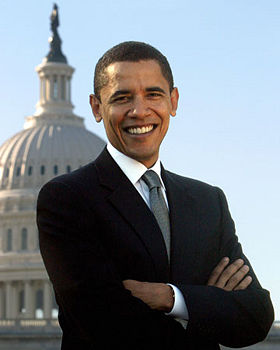Obama administration
Barack Obama entered office as President of the United States of America on January 20, 2009, as the nation's 44th president and the first African American to be U.S. head of state. His Vice President is Joe Biden, and his Secretary of State is Hillary Clinton, Obama's main rival for the Democratic Party nomination in the 2008 presidential election.[1] Obama approved the continuing service of Robert M. Gates, a Republican, as Secretary of Defense.
First 100 days
Foreign policy
Obama began his presidential term of office with a focus on foreign policy, particularly the Guantanamo detention camp and the Middle East. In line with his previous pledge to close the camp, Obama had military trials at Guantanamo suspended. He also called Middle Eastern leaders to pursue Arab-Israeli peace.[2] Obama appointed George Mitchell as a special envoy foe the Middle East, with former United Nations Ambassador Richard Holbrooke becoming special representative for Afghanistan and Pakistan.[3] On January 22, Obama signed an executive order authorizing the closure of the Guantanao camp within a year. This act, said Obama was to avoid "a false choice between our safety and our ideals," and to "restore the standards of due process and the core constitutional values that have made this country great even in the midst of war, even in dealing with terrorism." A second order banned torture by the U.S. Military, in effect terminating the Bush administration's authorization of extensive CIA interrogation techniques.[4]
Family planning
The Obama administration also overturned a policy by former President Ronald Reagan on federal funds for international family planning clinics that offer abortions. The reversal was in line with the same decision by previous Democratic President Bill Clinton, though this "Mexico City policy"[5] was reinstated by George W. Bush in 2001 as his first executive order. Obama also committed his administration to restoring U.S. contributions to the UN Population Fund (UNFPA), an organization with which the Bush administration refused to co-operate, alleging that it funded enforced sterilization.[6]
Exceptions to lobbying rule
An early controversy was Obama's nomination of William J. Lynn III as Secretary of Defense Robert M. Gates's deputy. Obama had previously promised that new members of his administration could not have worked as a lobbyist for the preceding two years; however, Lynn left defense contractor Raytheon in July 2008, so would need an exception made to the rule.[7] A similar case surrounded William Corr, nominated as the Department of Health and Human Services's deputy secretary, who had recently lobbied as an anti-tobacco advocate, but would not be involved in tobacco issues within the Obama administration. The President's spokesman, Robert Gibbs, told the Associated Press that "Even the toughest rules require reasonable exceptions."[8]
Other issues
In 2009, Obama became one the few presidents to take the oath of office twice, Chief Justice John Roberts having made a mistake on inauguration day. The renewed oath has no implications for Obama's legitimacy as President, as the new term begins automatically following the previous president leaving office.[9]
References
- ↑ CNN: 'Hillary Clinton sworn in as secretary of state.' January 21, 2009.
- ↑ BBC: 'President Obama tackles first day.' January 21, 2009.
- ↑ CNN: 'George Mitchell named special envoy for the Middle East.' January 22, 2009.
- ↑ CNN: 'Obama signs order to close Guantanamo Bay facility.' January 22, 2009.
- ↑ Named for the city in which the policy was first announced.
- ↑ CNN: 'Obama reverses abortion-funding policy.' January 23, 2009.
- ↑ Cybercast News Service: 'Deputy Defense Secretary Nominee May Need Exemption from Lobbying Rules.' January 22, 2009.
- ↑ Indianapolis Star: 'FACT CHECK: Exceptions made to anti-lobbyist rule.' January 22, 2009.
- ↑ CNN: 'Obama retakes oath of office after Roberts' mistake.' January 21, 2009.
